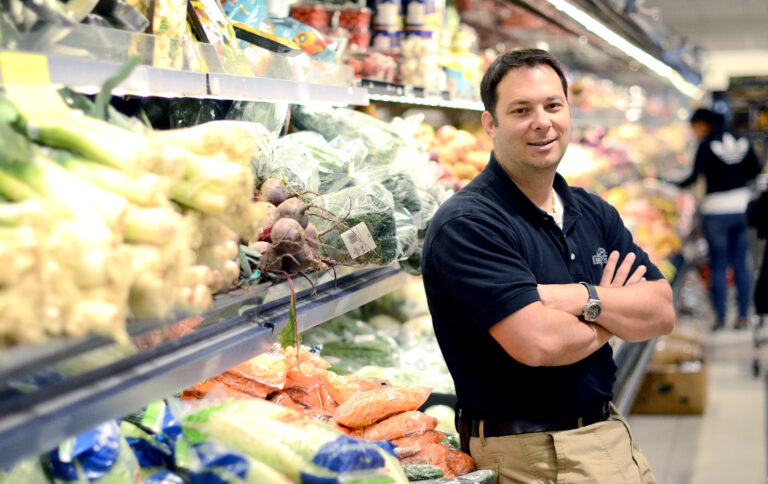Today, Zach Moniz manages two of Bermuda’s largest grocery stores, selling products sourced from all over the world, employing around 200 people, over 75% of whom are Bermudian, and close to 20 of whom are members of his own family.
He has been involved in the family business – which was founded by his maternal grandparents – since the age of 8, when he and his sisters, Hannah and Carrie, used to help pack grocery bags. Since then, he has seen the business grow from one small store in Devonshire, to two large stores in Devonshire and Warwick. He has managed major renovations, incorporated the pharmacies, dealt with major hurricanes, become the voice of Lindo’s adverts, and has helped to steer the business through a pandemic, and out the other side.
Mr Moniz’s maternal grandparents were Harry and Marion Lindo. His grandfather, who was born in Bermuda, was part of the Azorean diaspora, with his great-grandparents arriving in Bermuda from the Azores in the early 1900s.
Mr Moniz is also a descendant of the Azores on his father’s side, but they arrived in Bermuda earlier: “They were late 1800s,” he explained. “My great, great grandfather on the Moniz side came here, and then went to Massachusetts, then his son, my great grandfather came back, probably in the early 1900s, and they were more Bermudianised. My grandfather Lindo spoke Portuguese fluently, and my grandfather Moniz did not.”
His maternal grandmother Marion however, was from Pittsburgh. “She came to visit her brother, who was stationed here at the base. Her brother married my grandfather’s sister and took her to Pittsburgh, and my grandfather married my grandmother and took her from Pittsburgh to Bermuda,” he laughed.
Harry started his butchering business in Devonshire Bay, moving to Garthowen Estate after he and Marion got married, where they continued to run the business out of a “corrugated roofed shack.” When they were evicted from there, they “somehow secured a loan” for the property where Lindo’s Devonshire is now, and built a small store to sell their meat. The business took off from there.
“My grandmother was very industrious,” continued Mr Moniz. “She was like, ‘Well, if you’re going to have meat, I’ve got to have something to go with it.’ So, she started procuring groceries.”
In addition to purchasing produce and goods from others, the Lindos also grew some of their own: “Back then, everybody had a garden. Other people would plant this, you would plant that. You would barter with it,” said Mr Moniz. “He always had animals of some kind. He had a pigsty right on the property, he had dog kennels, Betsy the cow, goats, chickens.”
Over the years, it’s not only the Lindo’s grocery stores that have grown, but Lindo’s place within the community it serves: “We’re part of the community, number one. This is our community. We’re bricks and mortar. My business is Bermudian, and in Bermuda, and we try to run it in a way that is quintessentially Bermudian.”
As a business, therefore, the Lindo’s team make sure they serve, and give back. The annual Lindo’s to Lindo’s run and walk in aid of the Bermuda Diabetes Association celebrated its 25th anniversary this year. Other charitable endeavours include supporting Friends of Hospice and Agape House, sponsoring youth football, and donating non-perishable items to the Salvation Army. If people need freezers or fridges to store medication after a hurricane, and don’t have power, they can store it at Lindo’s.
That Lindo’s is still very much a family business is also at the heart of their good customer service, said Mr Moniz. “Having family members in, they have a vested interest in making sure that the customer gets what they want. We all find a niche to work in as family members and we all try to pull in the same direction. The goal is to provide value for money in a clean, up to date environment.”
In spite of their very best efforts, however, you can’t please everyone, and Mr Moniz has a few stories to tell.
“We always said we were going to write a book with the complaints,” he laughed. “Number one on the list was a lady who brought back 5lbs of potatoes and she wanted her money back because she said the potatoes would not cook! She just was adamant that no matter how much she boiled them, they did not cook. I gave her money back. They were regular Bermuda potatoes. I was dumbfounded.”
Another customer once asked the butcher if they had any grass-fed salmon. “The butcher just said yes and gave her the organic salmon,” he smiled.
While Lindos is steeped in family history, Mr Moniz must also plan for the future: “The environmental issue is a big one for us,” he said, and he has been involved in conversations with government about the potential ban on single-use plastics; in particular what he thinks is practical, and what is less so.
He has invested in “a massive array” of solar panels for the Devonshire store, which unfortunately wouldn’t work at the Warwick location because it “does not have the right angle to the sun. He has also replaced the refrigeration system for one that is “very high tech and energy efficient.”
From a technology perspective, he is watching carefully how artificial intelligence (AI) might impact the grocery business, in particular “what kind of predictions AI can make for you in terms of what products you need, and whatever it’s able to learn from what we already have in terms of information.”
In the meantime, it’s business as usual, and Mr Moniz continues to do it because “it’s a family business, and that’s why I care about it. I do it because of my kids and my family, and I think about their futures as well.” Also, because every now and then, he can treat himself to his favourite item in the store – a bag of Rowntree’s Randoms.

